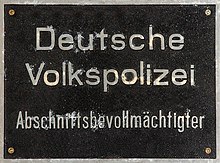Section representative
A section authorized representative (ABV) in the GDR was a police officer of the People's Police (VP), who was responsible for police tasks in communities, city districts and on sections of the Reichsbahn. In his section he was the police contact for the residents and was on patrol duty . He was responsible for receiving and forwarding criminal charges and police prevention . The ABV had similar tasks as a current police contact area officer . He held the rank of sub-lieutenant or lieutenant.
In addition, the ABV was responsible in its section for traffic controls, controls of compliance with the reporting obligation ( house books ) and external visitors as well as the control of state-mandated persons. He gave assessments about residents of his section, for example when a decision should be made about the re-issuance of a driving license after a ban or the approval of a trip to the non-socialist economic area . For the approval of such trips, the assessments of the ABV were viewed by the responsible employees of the Ministry for State Security and they served as the basis for approval or denial.
The ABV were introduced from October 1952 based on the Soviet model. The number of ABVs varied as follows:
- Berlin and major cities: 8 to 9 per police station
- in medium-sized cities, which mostly had only one district: 9 to 12
- in district towns: 6 to 12
- In the rural area of a district depending on the residential density : 40 to 80
The ABV in the GDR also received support from around 158,000 voluntary civilian helpers of the VP , of which around 10,000 were women (as of July 1989).
literature
- Federal Agency for Civic Education (ed.): Slow motion 23, Youth in the GDR. July 1989, p. 18f.
- Ilko-Sascha Kowalczuk : Who was the ABV? In: ders .: The 101 most important questions of the GDR. Munich 2009. p. 39f.
